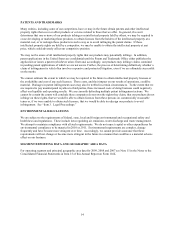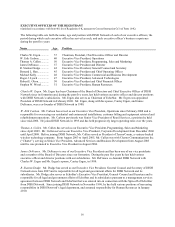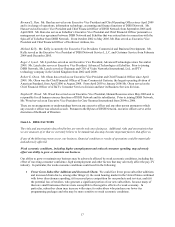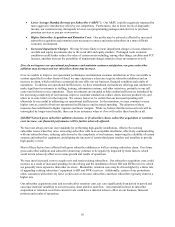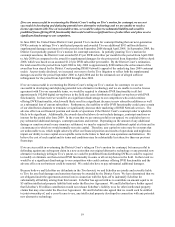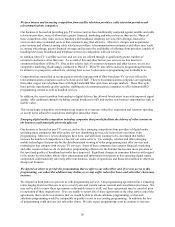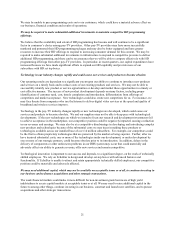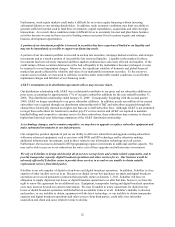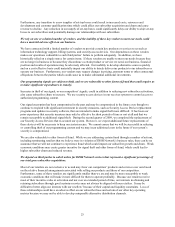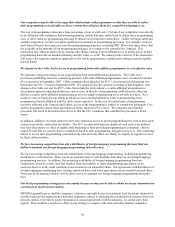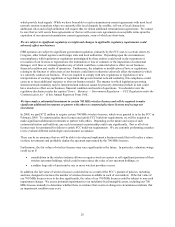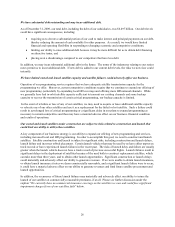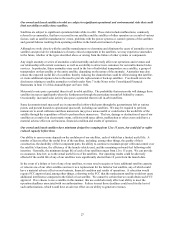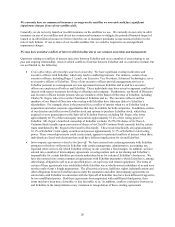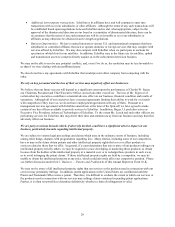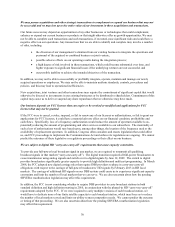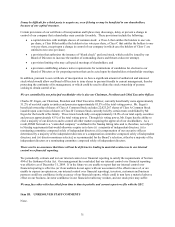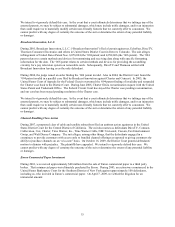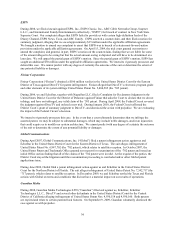Dish Network 2009 Annual Report Download - page 34
Download and view the complete annual report
Please find page 34 of the 2009 Dish Network annual report below. You can navigate through the pages in the report by either clicking on the pages listed below, or by using the keyword search tool below to find specific information within the annual report. 24
Our competitors may be able to leverage their relationships with programmers so that they are able to reduce
their programming costs and offer exclusive content that will place them at a competitive advantage to us.
The cost of programming represents a large percentage of our overall costs. Certain of our competitors own directly
or are affiliated with companies that own programming content that may enable them to obtain lower programming
costs or offer exclusive programming that may be attractive to prospective subscribers. Unlike our larger cable and
satellite competitors, we have not made significant investments in programming providers. For example, Comcast
and General Electric have agreed to join their programming properties, including NBC, Bravo and many others that
are available in the majority of our programming packages, in a venture to be controlled by Comcast. This
transaction may affect us adversely by, among other things, making it more difficult for us to obtain access to their
programming networks on nondiscriminatory and fair terms, or at all. We cannot predict when or if the transaction
will receive the requisite regulatory approvals or if it will be appropriately conditioned to mitigate potential public
interest harms.
We depend on the Cable Act for access to programming from cable-affiliate programmers at cost-effective rates.
We purchase a large percentage of our programming from cable-affiliated programmers. The Cable Act’s
provisions prohibiting exclusive contracting practices with cable affiliated programmers were extended for another
five-year period in September 2007. Cable companies have appealed the FCC’s decision and oral argument was
held before the D.C. Circuit in September 2009. We cannot predict the outcome or timing of that litigation. Any
change in the Cable Act and the FCC’s rules that permit the cable industry or cable-affiliated programmers to
discriminate against competing businesses, such as ours, in the sale of programming could adversely affect our
ability to acquire cable-affiliated programming at all or to acquire programming on a cost-effective basis. As a
result, we may be limited in our ability to obtain access on nondiscriminatory terms to programming from
programmers that are affiliated with the cable system operators. In the case of certain types of programming
networks affiliated with Comcast and Liberty, access to the programming is subject to compulsory arbitration if we
and the programmer cannot reach agreement on terms, subject to FCC review. We cannot be sure that this
procedure will result in favorable terms for us or that the FCC conditions that establish this procedure will not
sunset.
In addition, affiliates of certain cable providers have denied us access to sports programming they feed to their cable
systems terrestrially, rather than by satellite. The FCC recently held that new denials of such service are unfair if
they have the purpose or effect of significantly hindering us from providing programming to consumers. But we
cannot be sure that we can prevail in a complaint related to such programming, and gain access to it. Our continuing
failure to access such programming could materially and adversely affect our ability to compete in regions serviced
by these cable providers.
We face increasing competition from other distributors of foreign language programming that may limit our
ability to maintain our foreign language programming subscriber base.
We face increasing competition from other distributors of foreign language programming, including programming
distributed over the Internet. There can be no assurance that we will maintain subscribers in our foreign-language
programming services. In addition, the increasing availability of foreign language programming from our
competitors, which in certain cases has resulted from our inability to renew programming agreements on an
exclusive basis or at all, could contribute to an increase in our subscriber churn. Our agreements with distributors of
foreign language programming have varying expiration dates, and some agreements are on a month-to-month basis.
There can be no assurance that we will be able to grow or maintain our foreign language programming subscriber
base.
Our local programming strategy faces uncertainty because we may not be able to obtain necessary retransmission
consents from local network stations.
SHVERA generally gives satellite companies a statutory copyright license to retransmit local broadcast channels by
satellite back into the market from which they originated, subject to obtaining the retransmission consent of the local
network station. If we fail to reach retransmission consent agreements with broadcasters, we cannot carry their
signals. This could have an adverse effect on our strategy to compete with cable and other satellite companies


